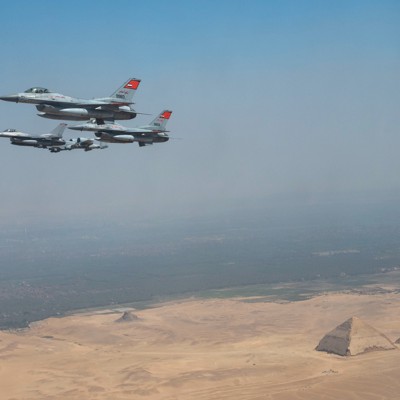Egypt is prime real estate in a bad neighborhood. On its eastern border, it has the Gaza war, and is struggling to contain the combat while dealing with popular opinion which is horrified by the scale of destruction in Gaza yet fearful that the Gazan population will be “relocated” into Egypt.
To the South, it has Africa’s most deadly civil war, now extending into a multi-year conflict that strides Egypt’s life-line—the Nile—and could trigger a mass migration of refugees that would upend Egypt’s already fragile economy. Russia—always eager to fish in troubled waters—is on the verge of establishing a deal with Sudan’s military government to build a permanent naval base in the Red Sea.
To the West is the ongoing war in Libya, another disaster which is continually threatening to spill over in multiple directions, and which has been a breeder of insecurity for most of Northern Africa.
The Egyptian regime, which came to power in an irregular fashion, struggles to deal with these external challenges while at the same time still fighting an underground Islamist terror threat and reforming an economy with structural flaws and that is still reeling from the damage of COVID and regional conflict. While Egypt’s challenges are manifold, even the most superficial analysis will point to the need to establish and maintain security as an essential condition for the Arab world’s most populous nation to effectively address its other threats.
Since the Camp David accords, Egypt has been among the U.S.’s most reliable security partners in the Middle East and North Africa. Egypt has emerged as a key link in American security planning for the region, providing critical overflight rights for various U.S. contingencies, ensuring priority U.S. access to the Suez Canal, and hosting Bright Star, the U.S.’s largest and longest-running series of military exercises in the region.
Egypt also has issues with governance and respect for human rights. The U.S. track record in promoting reform in Egypt is not one of unalloyed success, but Egypt has shown responsiveness and a willingness to remain engaged on these issues. What is beyond question is that, should Egypt succumb to any of its internal or external threats, the governance and human rights situations will be far worse—as we’ve seen more than once.
Given the challenges Egypt faces, its leadership has understandably prioritized stabilizing their security situation before addressing other concerns. While the U.S. is the largest donor of security assistance to Egypt, in recent years Egypt has come to view America as an unreliable partner, and has sought to hedge its bets, particularly with military equipment. U.S. procurement lags of up to seven years have led the Egyptians to seek other suppliers, and an internal CENTCOM estimate suggested that interoperability with U.S. forces has declined to as low as 30%. Whatever the actual loss is, the fact remains that Egyptians have always maintained that the U.S. is its first partner of choice but has had to seek alternatives for military suppliers, creating a force which is less likely to operate smoothly as part of coalition operations.
This erosion of Egyptian interoperability is not the result of a conscious policy decision and is not the Egyptian preference. Rather, it represents a series of small factors – such as U.S. procurement delays, or temporary restrictions on certain weapons transfers—which in the aggregate damage the security posture of both Egypt and the United States.
While reforms to U.S. security cooperation could be part of the answer to this erosion, there are a few small, low-cost steps which could help create a better climate for joint security cooperation.
First, the U.S. should consider drafting a bilateral security cooperation agreement with the Egyptians. Such an agreement need not have the formal weight of a treaty; we have such agreements with Jordan (which runs for seven years), with Ukraine (ten years), and Bahrain (five years). The Bahrain agreement, which also covers some economic and scientific cooperation, envisions other parties joining, so it could be extended to Egypt with minimal effort.
Such agreements do little more than codify existing U.S. commitments, but they do so in a matter which is recognized by our partners as a more enduring commitment and a basis for long-term cooperation. They would go a long way towards dispelling the persistent fear of U.S. abandonment and form the base for re-establishing a cooperative and interoperable security partnership.
This is not a tradeoff of U.S. interests. Egyptian security enhances American security and advances U.S. interests in a region where American interests have taken a beating. Our partners can undertake political and military reform, but only if they feel they are in a position of security. We can improve Egypt’s security at minimal expense. We should do so yesterday.
DB Des Roches is a professor at the Near East South Asia Center for Strategic Studies, National Defense University. The opinions in this piece do not necessarily reflect those of National Defense University or the U.S. government.
Read the full article here


:quality(70)/cloudfront-us-east-1.images.arcpublishing.com/archetype/SQ5DQOL7ZFDBHOBZTLRY4DSU5Y.jpg)
:quality(70)/cloudfront-us-east-1.images.arcpublishing.com/archetype/E43XN2JDZZAMXOSMQBU5SPU53E.jpg)

:quality(70)/cloudfront-us-east-1.images.arcpublishing.com/archetype/XASOEXOQIZBHNJPL4LU45DSLZ4.jpg)
:quality(70)/cloudfront-us-east-1.images.arcpublishing.com/archetype/RSFS6KNG75CBFJRRCYCBZIWY4M.jpg)
Leave a Reply